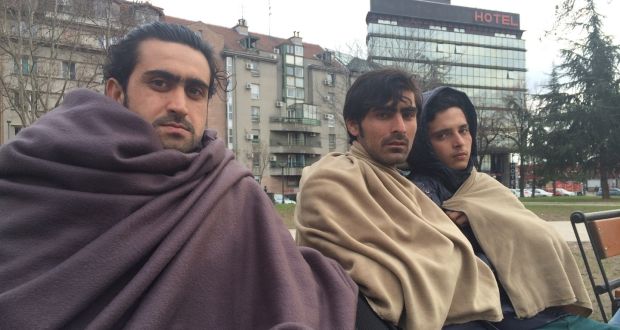Hotline: +381 61 63 84 071
Smugglers offer migrants escape from Balkan limbo

Risky and expensive ‘shadow network’ leading to EU operates alongside official route.
The day grew colder as it drew on, and under a rain-heavy Serbian sky the huddled Afghans pulled their blankets tighter at the thought of approaching night.
“We’ll sleep here, probably, along with everyone else. Women, children – everyone,” said Abdullah Khosty, sitting in a square near Belgrade’s central train and bus station that is once again a focal point for restless refugees and migrants.
Last summer, the square became a staging post for asylum seekers travelling through the Balkans to western Europe, but now it is a grim limbo for migrants who are prevented from moving on and unable or unwilling to go home.
Balkan states now allow no more than about 580 Syrians and Iraqis to cross their borders each day and, on recent days, far fewer have been admitted; those countries – Macedonia, Serbia, Croatia and Slovenia – say they are reacting to daily limits imposed by Austria.
As a result, some 10,000 migrants are stuck on the Greek border with Macedonia, 15,000 more are elsewhere in Greece, and an unknown number are scattered around the Balkans – in state transit centres, makeshift camps like this Belgrade square and throughout a shadow network of routes used to smuggle desperate people across frontiers that are officially closed to them.
Khosty (23) said he and his companions paid $6,000 (€5,500) each inAfghanistan for the services of smugglers who would, supposedly, get them toGermany.
“Crossing Iran we had an Iranian ‘guide’; in Turkey an Afghan, and inBulgaria a Pakistani,” he recalls. “But in Serbia, we have no one.”
Unlike the vast majority of more than one million migrants and refugees who reached Europe last year, and 120,000 who have already arrived in 2016, Khosty’s group did not sail to from Turkey to Greece but trekked to Serbia via Bulgaria.
They were barred from crossing into Croatia, however, and spent between 10 and 15 days at the Sid transit camp in north-west Serbia before police put them on a bus back to Belgrade.
“Syrians and Iraqis are allowed to go on to Europe, but now Afghans are stopped,” said Khosty’s friend, Niyaz Rahmadze (22).
“They say there is no war in Afghanistan – if I could take them there, I would show them our war.”
The Afghans said Serbian police swore at them, slapped one of them across the face, and ordered them to go to the remote Sjenica camp some 250km southeast of Belgrade – but they had no money to get there, even if they had wanted to.
“Last night,” said Rahmadze, “they took us to a dormitory near Belgrade that was like a prison. Ten of us had to share six beds, and they locked us inside the room. They only let us out to go to the toilet, and gave us no food or water.”
The Afghans’ claims could not be checked, but they and their compatriots in Belgrade were aggrieved that Europe was effectively telling them to return to their homeland, where last year more people were killed and injured than at any time since the US-led invasion of 2001.
“If the EU can’t help Afghans, it should announce that and close the borders completely, so families and children stop coming,” said Khosty.
Even Syrians and Iraqis are now struggling to transit the Balkans and Austria, according to Serbian aid workers who say that any irregularity with identification papers can prompt a refusal at a border, where Arabic speakers hunt imposters by checking refugees’ accents and their accounts of life at home.
Experts warn, however, that instead of slashing the number of people seeking a new life in Europe, the border restrictions are only boosting business for smugglers who are thought to have netted as much as €6 billion last year.
“Alongside the ‘official route’ to Europe there is a ‘shadow route’ that still operates smoothly,” said Jelena Hrnjak, programme manager at Atina, a Belgrade-based association that combats human trafficking and gender-based violence.
This route is run by criminal gangs that form a loose network all the way from countries like Afghanistan or Pakistan, through Turkey and the Balkans and into western Europe, with collusion from some police officers and border guards.
Atina regularly records accounts of violence and sexual abuse by these gangs against migrants and refugees, and its teams work at Serbian border crossings and in Belgrade to identify and assist potential victims.
Hrnjak also believes that people arriving in Europe now have less money than those who were able to travel last year, making them even more vulnerable to violence and exploitation.
“Closing borders won’t stop people getting to the EU,” she said, “but they have to give lots of money to smugglers and run the risk of being abused.”
Khosty said he and his friends, penniless in Belgrade, would probably apply for asylum in Serbia
“And then, later, we’ll carry on to Germany,” he added.
Source: http://www.irishtimes.com/news/world/europe/smugglers-offer-migrants-esc...












 FACEBOOK
FACEBOOK TWITTER
TWITTER YOUTUBE
YOUTUBE